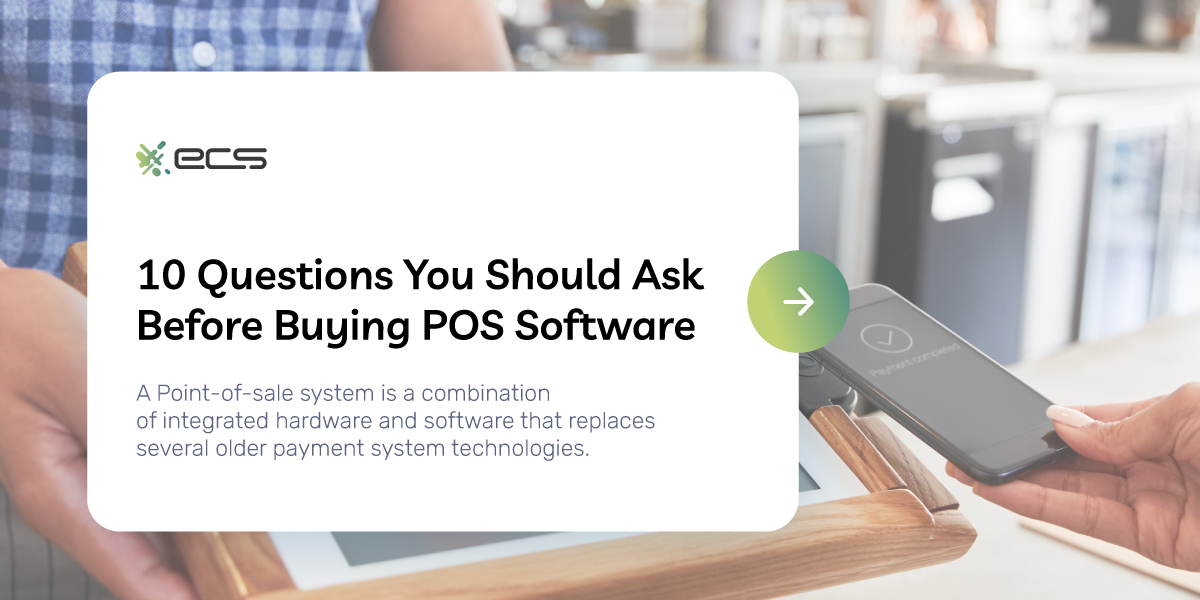Whether you’re just about to open a new business or an established business looking to upgrade, your choice of Point of Sale (POS) software is one of the most important decisions you can make.
Undoubtedly, technology is at the core of almost all business operations today. Whether through automation or integrating various systems for efficiency, technology allows successful businesses to grow and scale.
A point-of-sale system is central to that type of automation and integration for any retail business or restaurant. But knowing how vital a POS system is to your success is only half of the equation. The other half involves choosing the right one to fit your needs today and into the future.
To help you make a more informed choice when deciding on a new POS system, we’ll cover the top 10 questions you should ask yourself before making your decision. We’ll also cover the basics of POS systems and how to leverage them to cut costs and scale your business.
What Is A Point Of Sale POS System?
A Point-of-sale system is a combination of integrated hardware and software that replaces several older payment system technologies.The main advantage of a POS system is the software that controls the entire system.
This software works similarly to your computer’s operating system. This means you can add additional functions and apps suitable to your POS system, similar to the way you do with a computer or smart device.
These additional apps and features extend your POS system to perform functions such as automatically tracking inventory, managing employees, and more.
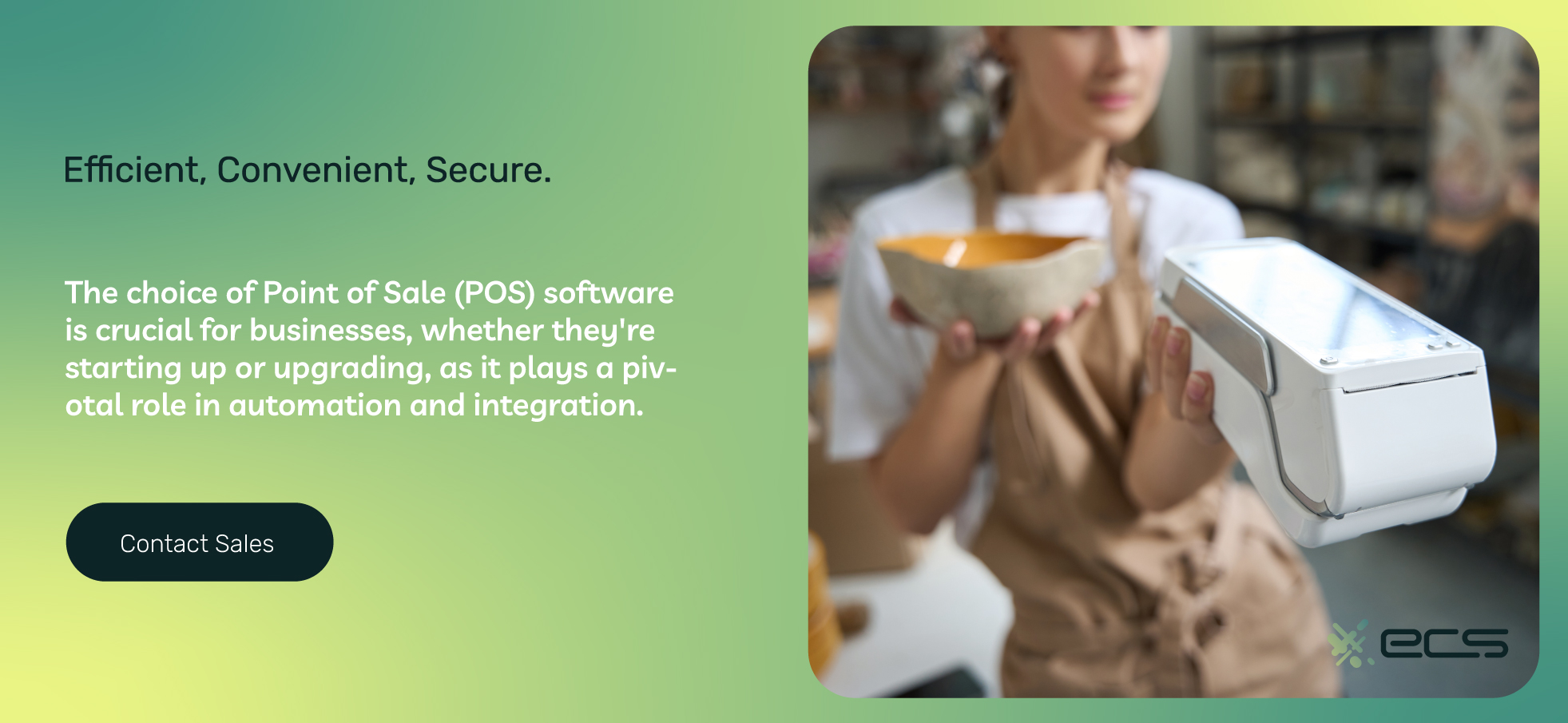
The Two Parts Of A POS System
A modern POS system consists of two main parts: the hardware and the software.
The hardware includes items such as the main POS terminal. The main terminal is how you and your employees access the POS system. It will generally have a touch screen where you can handle payments and administer the entire system.
POS hardware includes an integrated cash drawer, payment terminals or card readers, and printers. Depending on your business, you may also need a barcode scanner or other peripherals.
Next is the POS software. The software you choose will usually depend on your specific industry. Different POS software vendors specialize in providing solutions for specific industries.
For example, most restaurants use POS systems specifically designed for the restaurant and hospitality industry.
Sometimes, these systems are all sold together. However, in some cases, you can use separate hardware and software as long as they are compatible. This means you can usually upgrade specific components of a POS system without changing the whole system.
10 Questions To Ask When Buying POS Software
To make the best choice when choosing POS software, use these 9 questions as a checklist to help you narrow your choices to the best options to fit your business and your goals.
Queston 1: What Hardware Do I Need?
The first step in choosing a POS system is determining exactly what hardware you need. You want this to be your first step because adding hardware or updating outdated hardware may be complicated further down the road if the system is not designed for it.
Below are some areas to consider for the hardware you may need.
Screens
Most every POS system will have a screen so your employees can access and manage the system. However, in some cases, you may also want a customer-facing screen.
A customer-facing screen is to help verify orders or totals. For some businesses, you may need the ability for customers to interact with the screen.
For example, if you take reservations or need customers to sign waivers at your business, a customer-facing screen can facilitate that process.
Another reason you would want a customer-facing screen is for loyalty reward program sign-ups. Customers can quickly sign up at the checkout and immediately enroll in your program.
The type of business you operate may also require different POS screens. One example is in a restaurant where you might need kitchen displays to show orders as they come in.
So, determine how many screens you need and whether you need customer-facing screens.
Payment Terminals And Mobile Processing
You can use payment terminals and card readers to accept digital payments like credit and debit cards or digital wallets.
You have a few choices when it comes to payment terminals. You may only need one payment terminal if you have a smaller business and only one cash wrap area.
If you have cash wraps throughout your store, you may want wireless card readers to make installation easier and cleaner looking, especially if you’re going for a stylish look in your store.
The next thing you should consider is mobile processing. Mobile processing hardware allows your employees to accept payments on tablets or smartphones wherever they happen to be.
For example, if you have a restaurant with an outdoor beer garden, mobile processing terminals allow your staff to handle all payments at the beer garden without having to go back inside to complete the transaction.
Printers, Scanners, And other Accessories
Depending on your business and checkout workflow, you may want to add accessories to the POS hardware.
For example, barcode scanners are standard in retail settings or when you need to scan items, check IDs, or scan other types of cards.
Depending on your business, accessories like printers can either be in small format for receipts or larger format for invoices or work orders.
Overall, you want to be sure your POS system is compatible with the accessories you’ll need to run your business.
Hardware Required For The POS
Finally, the POS system requires specific hardware to function, along with the various hardware devices attached to it.
This can include wireless routers, cabling, keyboards (if needed), and any other hardware the POS vendor requires to make the system operational.
Your POS vendor may supply these items in some cases. In other cases, you can provide them yourself.
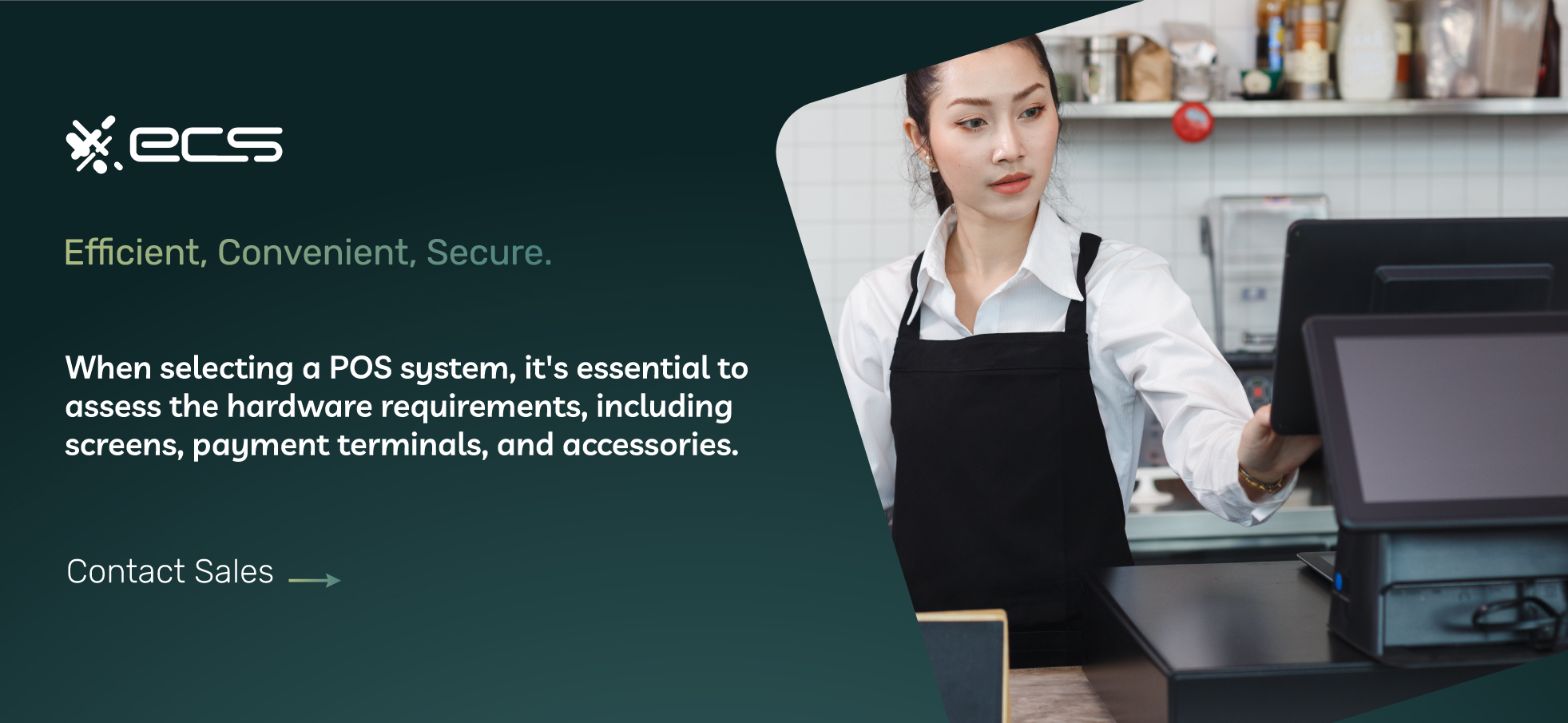
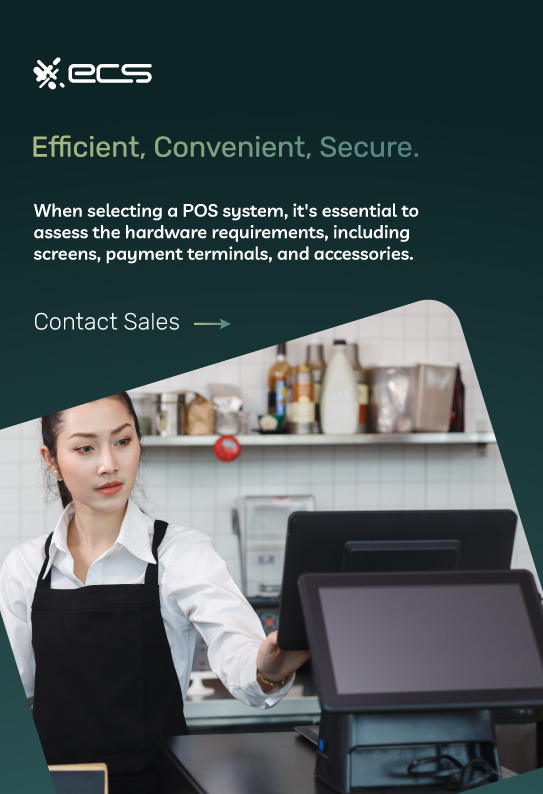
Question 2: What Core POS Functions Do I Need?
To help you narrow your choices, you want to decide on the core functions you need from your POS system. This will be different for every business, but you want a POS system that excels at the core functions you require.
For example, if you’re a restaurant that has a large service area and you want your servers to be able to take orders and send them directly to the kitchen, you want that type of workflow to be central to your POS system.
If the POS system can achieve that functionality but requires add-ons, it’s not a core function and probably not a great fit.
Make a list of the main functions you need to keep your workflow as efficient as possible, then find POS systems that perform those functions right out of the box with minimal configuration.
What Does My Current POS Not Do?
A related question you can ask yourself when determining the best retail point of sale system is which parts of your current POS or checkout processing are lacking.
If there are glaring problems in your payment processing and checkout workflow that you and your team are constantly struggling with, make note of these issues.
Then, use that list of features as a checklist when shopping for a new POS system. Once again, you want to find as many of these core features within the new POS as possible, not just something that can be bolted on as an afterthought.
You may not be able to get your full wishlist. But you want as many core features as possible to satisfy your list.
Question 3: What POS System Integrations Do I Use?
You likely already have specific applications you use to run your business. These can be back-office programs like accounting software options or even HR software.
If you’re happy with these software programs and want to carry them over, you want to ensure your new POS system is compatible.
For things like accounting software, make sure your new POS software has direct compatibility or can export information in a format your accounting software readily accepts.
For HR or payroll software, you want to be sure your POS software can export the necessary data to that program.
If you’re using popular software such as Quickbooks or ADP Roll, most POS systems will have built integrations for these programs. In those cases, you should have no trouble moving your data between the two systems.
The most ideal compatibility is if there is a direct integration between the software you use and the POS system. The least ideal integration is if the POS system only exports in a standard format, such as CSV or another data format.
Data exports like this sometimes have issues and may not create a smooth experience.
Question 4: How Important Is Inventory Tracking To Me?
Inventory tracking is critical for every business. But for some businesses, it’s easier than others.
For example, if you sell a small number of higher ticket items, your inventory tracking is probably relatively simple. So, this may not need to be very high on your list.
However, if you have a more complicated inventory or supply chain, inventory management is critical to keeping items on your shelf.
In these cases, you want to ensure your choice of POS software has robust inventory tracking features, including real-time inventory management.
You also want to be able to quickly scan your arriving inventory without excessive manual entries.
If you run a restaurant or bar, inventory management is as important as in a retail setting. Restaurant POS systems can track inventory for each ingredient as you sell dishes, offering a real-time inventory of every item.
Overall, proper inventory management helps your business save money, reduce labor costs, and make better financial forecasting models.
Question 5: What Customer Experience Are My Top Competitors Offering?
A POS system enhances your business operations and helps you cut costs. But a POS system also improves customer experience in your restaurant or retail location.
A perfectly integrated POS improves the customer experience by offering the most payment options that customers demand. For example, full integration with Apple Pay or Google Pay so customers can quickly pay with their smartphones.
Customer behavior towards payment and the overall retail experience has changed drastically in the last few years. Contactless payments, such as digital wallets, went from being a novelty to now being the fastest-growing method of payment chosen by consumers.
But it’s more than just payment methods. Emailing receipts or offering similar optional receipt delivery options is also essential.
One way to decide which features you may lack is to look at top-performing competitors in your industry. Examine their customer experience and look for ways to easily adopt some of their methods through your POS implementation.
Personalization is everything in today’s digital business environment. A POS system can capture customer data in ways that weren’t possible just a few years ago. This will enable you to offer the highly personalized service that customers demand.
Many of these more advanced features were only developed recently. So, even a POS system from just five years ago may be starting to show its age.
These are all things to consider when choosing a new POS system to ensure you provide the best possible customer service.
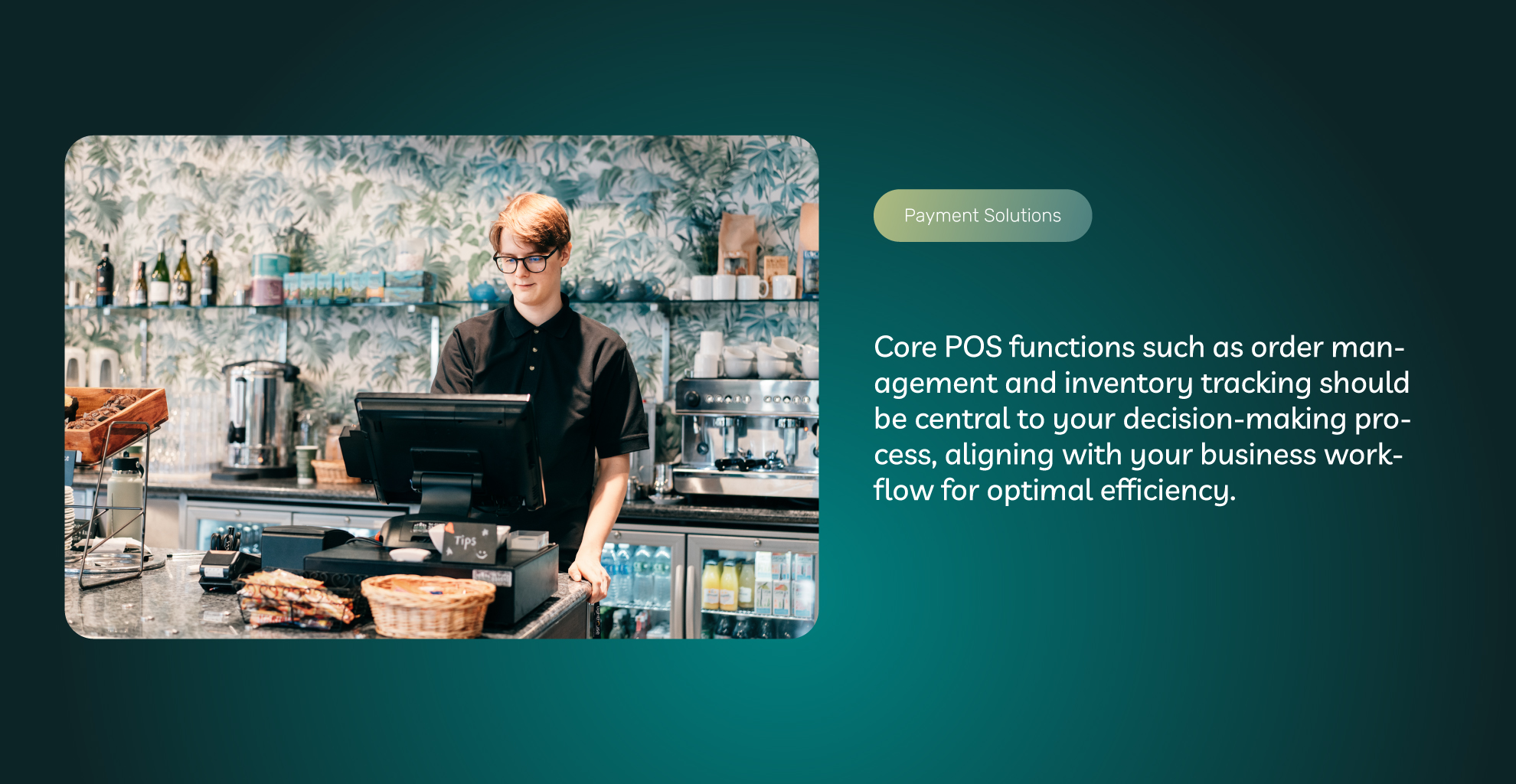
Question 6: What Are My Payment Processing Options?
Your merchant account and payment processor are central to your business. It’s how to take digital payments, and it can also be a source of lost revenue if you are paying fees that are too high.
Some POS systems will lock you into a specific payment processing and merchant account type. This lack of flexibility will almost always cost you more money with each transaction.
When a POS system locks you into their payment processing, you don’t receive your own merchant account. Instead, you are processing through the POS vendor’s merchant account and all their other customers.
Using this type of setup, the vendor can generally sign you up faster and without an approval process. However, your fees will always be higher with this type of setup. Worse than that, you’ll have less control over your payment processing, which is never good.
Instead, choose a POS system that allows you to utilize your own merchant account and payment gateway through a trusted payment processor.
This will ensure you get the lowest fees and fee structure possible. You’ll also have total control over your payment processing workflow.
If you already use a POS system that locks you into the vendor’s payment processing, that’s a sign it’s time to upgrade to a new, more flexible solution. You’ll save money and have more options to accept payments in a way that fits your business best.
Question 7: What Type Of POS Contracts Do I Want?
Many modern POS systems are cloud-based. This means most of the system and data operate on the vendor’s servers in the cloud. The advantage is that your POS system is always updated with the latest security patches.
This also means you will generally have to pay a monthly fee to use the POS system. Some systems have contracts for 1-3 years. You can pay monthly or annually if you prefer.
Carefully examine these contracts to determine what they involve and the total cost if you were to leave. Some contracts can have steep penalties if you need to suspend the service. Other agreements can automatically renew unless you notify the vendor well in advance that you are switching services.
Contracts can be a regular part of business, but if your POS contract seems unusually long or has penalties and fees attached to it, it probably isn’t a good idea to sign it.
Total Cost Of Ownership
This is related to contracts, and it’s just as important. When shopping for a new POS system, try to determine the total cost of ownership. For example, check if you need to purchase or lease any hardware, which adds to the total POS cost.
Another hidden cost could be any training or setup that is needed. Most POS systems are relatively easy to use. But in some more extensive retail or restaurant settings, training is appropriate to bring your staff up to speed.
Check if your POS vendor can offer any onboarding services like training for free or at a reduced cost if you choose their product.
Finally, check for ongoing maintenance or replacement costs in case hardware breaks or replacement.
All of these things may have associated fees or costs, which can balloon your total cost of ownership beyond what you had initially budgeted for.
Question 8: Do I Need Analytics?
Analytics used to be reserved for larger businesses with dedicated IT departments and data scientists on the payroll. But today, businesses of all sizes leverage modern data tools to unlock insights into their business and customers.
POS system real-time insights and reporting can be an excellent way for your business to start using analytics to make data-driven decisions that have immediate positive results.
Since a POS system collects payments, manages inventory, and interacts with customers, it captures most of the data you need for a modern business intelligence strategy using analytics.
Some POS systems will have these capabilities built-in. They will generally also offer visualization tools so you can quickly create graphs and charts to see your analytics at a glance.
If you require more advanced analytics beyond what the POS system offers, seek out POS options to incorporate additional functionality using third-party analytic software and apps. If so, ensure your chosen analytics tools are compatible with your POS system.
Question 9: Do I Need eCommerce Or Omnichannel Capability?
Many physical retail businesses today also offer online ordering of some kind. If your business has an e-commerce component or wants to add one, you’ll need a POS system that can handle omnichannel sales.
With omnichannel sales, you want your customers to have a seamless experience regardless of how they purchase from you. This means when they walk into the store, order online, or use a mobile app, the experience is the same.
A POS system designed for multichannel support can help you achieve this seamless customer experience.
If you run a restaurant, you may need something similar for online or mobile app ordering.
Not all POS systems will have this type of omnichannel support built-in. So, if this is a core feature of your business, it’s something to put high on your list of requests when shopping for new POS systems.
If you don’t need omnichannel support yet, you still want to find a POS system that allows you to add this functionality later, either through a third-party app or a module directly from the POS vendor.
Question 10: Which Payment Processor Should I Choose?
When keeping your ongoing costs low, your choice of payment processor is likely the most critical question you should ask.
Some POS vendors will lock you into their own payment processing solution. At first glance, this may seem like a good idea. Since the two are paired together, it should make setup that much easier.
While this is partially true, the real truth is that integrating a POS system with a different payment processor is relatively easy. In many cases, using a different payment processor only requires an extra few minutes to set up within the software.
The benefit of this change is that it could save your business thousands of dollars per month in fees.
Most POS vendors lock you into their payment processing because they have higher fees than if you chose a separate payment processor and merchant account.
These higher transaction fees mean you lose money with every purchase a customer makes at your business. This can add up quickly, which could be thousands of dollars in lost revenue.
These bundled merchant accounts also have less flexibility than if you applied for your own merchant account through a separate payment processor.
For the lowest cost solution, you should use a POS system that allows you to use your own merchant account obtained through a payment processor. The cost savings and increased control you have over your business are well worth it.
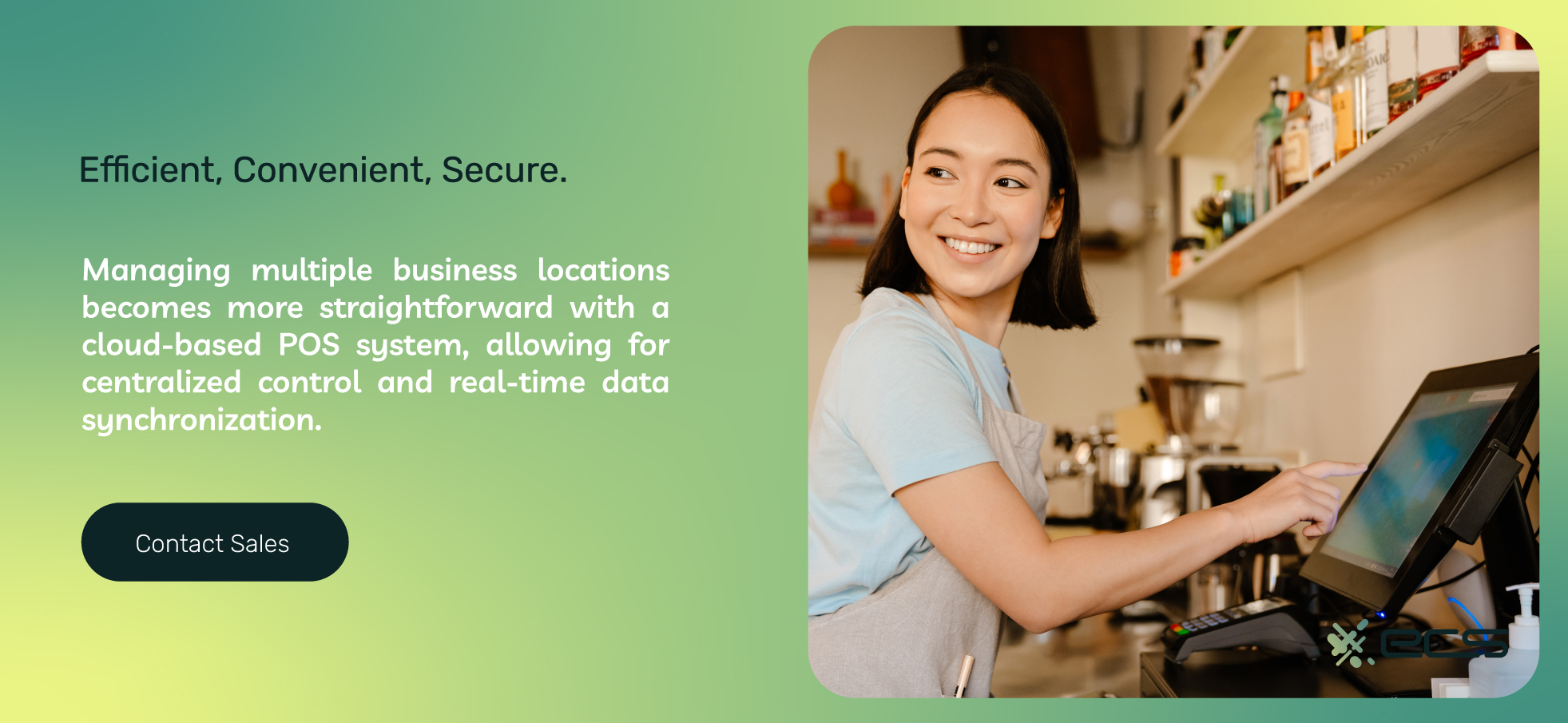
Additional POS Questions And Answers
We’ve reviewed the top 10 POS questions every business should ask. However, you may have more questions regarding a new POS system.
Below are a few answers to some of business owners’ most common POS questions.
What Is A Cloud POS System?
A cloud POS is when the vendor manages most of your software and data in the cloud. This is different from an “on-premise” solution where you are responsible for the upkeep and maintenance of the software.
A cloud-based POS system can lower your overall technology costs by reducing the infrastructure you need to maintain the software and hardware.
With an on-premise solution, you must secure the point-of-sale software and any data. This can be expensive and require dedicated personnel.
The downside of a cloud POS system is that you have to pay an ongoing lease price, generally monthly or annually. You also need a full-time internet connection, although most systems can process basic transactions if the connection is down.
Is My Customer Data Safe With A Cloud POS System?
You need to ensure the data is safe whenever you process transactions or hold sensitive information like bank account numbers.
All reputable cloud POS systems maintain Payment Card Industry (PCI) compliance, ensuring that they hold all data in accordance with the Payment Card Industry Data Security Standards (PCI DSS).
What If I Have Multiple Business Locations?
A cloud-based POS can make managing different locations much easier for you. You can push new pricing or inventory changes directly to each location from wherever you are. Also, all your stores or locations can sync data in real time, so you always know exactly what’s happening at each store.
Can I Use My Own Hardware With A POS System?
Yes. Some POS systems allow you to use specific existing hardware. For example, you can use existing mobile devices like iPads or tablet PCs for particular processing tasks. You must install software on the device first and sync it with the POS system.
Can I switch Payment Processors & Keep My POS?
In many cases, you can switch payment processors if you want to. Some industry-specific POS systems are tied to the vendor’s payment processing. This isn’t ideal, and you should eventually migrate away from those setups.
More Help Finding The Perfect POS System
If you’re looking for the perfect POS system for your business, ECS Payments can help.
We offer complete POS and payment processing solutions for modern businesses looking to leverage the latest technology to boost revenue and cut costs.
Contact ECS Payments today to learn more about our POS solutions and digital payment services.
